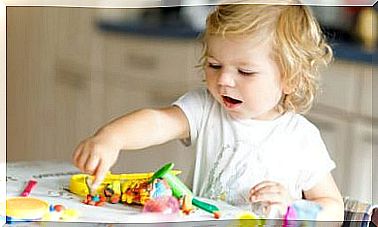Should We Be Friends With Our Children?

Compared to the past, nowadays the relationship between parents and children has undergone profound changes. It is no longer an authoritarian, rigid relationship with clearly defined limits, but it has transformed into a closer and more informal relationship. Currently, we are more friends with our children than parents. In addition, many parents argue that being confident and accomplices of their children is a good method of education.
The relationship between fathers and children today
The relationship that today most parents establish with their children, even during the most complex phase of adolescence, is characterized by the fact that it is a more intimate relationship. Today’s parents try to be more in contact with their children, to spend time with them, to keep up to date on what they do, their fashions, to share outings and interests.
Many parents decide to establish an equal relationship with their children. And, sometimes, it is not easy to distinguish who, between parents and children, are the ones who set the limits and possess the authority.
The children of past generations asked for permission as much to leave the house as to do anything. Today they just inform or warn. The way of addressing and speaking to parents has also changed: today it is much more frequent to give of the you.

Because it is not advisable to be friends with your children
Even if the relationships between parents and children have changed compared to other periods in our history, parents must be very careful in establishing and adopting an educational style and a relationship with their children in terms of “friendship”.
First, there are certain social roles that have their own raison d’etre; in other words, they perform a certain function in relationships between people. Consequently, we must not lose sight of the fact that there is a social role corresponding to that of parents. Parents must inspire authority and set limits, always, of course, on the basis of dialogue, trust, respect and love.
Secondly, parents cannot become friends with their children, because that would mean supporting that role in all circumstances of life, and that is impossible. It is precisely children who, at times, require the authority, presence and reference point offered by adults. They are the ones who need that form of control based on the maturity and security of experience.
So, the answer to the question whether or not we should be friends with our children is no. Alicia Banderas, in her book Pequeños tiranos (“Little Tyrants”), argues that parents cannot be friends with their children and that their educational task is to find the balance between authority and affection. The author states that parents must know how to set limits in time, to prevent their children from turning into authentic tyrants.
Establishing a friendly relationship with them is not the same as being friends with our children
Parents, instead of becoming friends with their children, can try to build a friendly relationship with them without abandoning their role as parents. So, to establish a friendly relationship with our children we should take into account that:
- Dialogue, reasoning and negotiating limits is right, but establishing them is essential. Parents must know how to say no and offer their children the right reasons to motivate it.

- We should show them affection, intimacy, physical contact. Without the need to be friends with their children, parents can establish a loving relationship with them, which fosters dialogue and fluid communication.
- Even if there are friends for confidences, this does not mean that children cannot share their worries, needs, joys and fears with their parents. To this end, it is important that parents inspire enough trust in their children to make them feel they can share their problems. At the same time, however, so that they know how to accept the opinions and advice they receive from parents.
Ultimately, a friendly relationship with our children is …
A healthy, open, honest, flexible and communicative parent-child relationship. But also, and equally important, a relationship based on respect for parental authority and on the acceptance by the children of justified and agreed limits.
In a relationship that is friendly and not one of friendship between parents and children, it is possible to make authority and love compatible. This is a fundamental aspect to ensure that children understand that the decisions and actions of parents have no other purpose other than the good, safety, happiness of their children.









